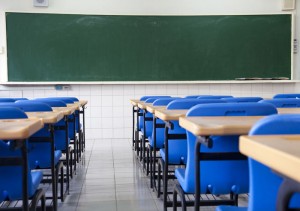Classroom Politics: Florida’s New Law on Education
 Image credit: tomwang / 123RF Stock Photo
Image credit: tomwang / 123RF Stock Photo On July 8 a Florida law took effect that gives residents from all over the state, regardless of whether or not they have children in Florida’s public school system, the opportunity to contest what kids are learning in public schools. Signed by Governor Rick Scott (R), this law is just one more in a long string of state legislation across the country that specifically challenges the curriculum surrounding climate change and evolution.
The law specifically targets a range of instructional materials, from films to books that have been called “anti-American,” “pornographic,” or “pro-Marxist.” The Florida Citizens Alliance (FLCA), a group whose mission is to “stop federal overreach and restore our individual rights guaranteed under the Constitution,” spear-headed the bill with the ultimate goal of banning what the deem objectionable materials from classrooms.
Florida’s dystopian turn is a worrisome reality for local and national science advocacy groups that have been fighting for proper science education for years. Florida Citizens for Science (FCS) President Jonathan Smith lamented the law in an email response to me: “This has the potential to undermine all the work we have done in the last eight years and again impose a minority’s religious convictions on the rest of us.”
The threat posed by the new law also functions as a renewed, if familiar, call to action. Glenn Branch, the deputy director of the National Center for Science Education (NCSE), explained to me that what Florida’s doing isn’t new: “We don’t anticipate any novelties from Florida now that the instructional materials law is in place. But we may see a greater volume [of work] as creationists and climate change deniers take advantage of the new opportunity to harass their local school districts.” As the teaching of evolution and climate change continues to be attacked, the NCSE and the FCS will continue their work to monitor local county school boards and support teachers with resources for teaching those important scientific topics.
It’s worth noting that the eleven-page list of “objectionable materials” that catalyzed this legislative censorship covered more than just evolution and climate change. In short, it was a document lamenting the primacy of what is commonly thought of as leftist, cosmopolitan values. In an affidavit given by Florida educator Deirdre Clemons, she accuses the school’s curriculum of “demot[ing] American values, undermin[ing] the Constitution, and detach[ing] children from faith and family” in order to bolster a “global society” where “the environment is paramount.”
Moreover, the nonprofit Citizens for National Security claimed that Florida students were being “religiously indoctrinated” into Islam through twenty-five textbooks that had “egregious errors, glaring omissions, questionable inclusions or political, ethical, cultural, and other biases that clearly seek to foster an Islamic agenda.” The organization issued a report that charged Pine Ridge Middle School in Naples, Florida, for “politically indoctrinating” eighth-graders with “pro-open borders articles” that discussed themes of illegal immigration and what it meant to be an American.
Public school curriculums and textbooks have been hotly contested for years with some educators saying they “whitewash” history by leaving out the study of discriminatory laws such as Jim Crow, while others say that so-called American exceptionalism has been scrubbed from the texts, creating “a depressing, slanted view of American history.” It’s clear to see with the passage and implementation of Florida’s new law that the latter argument of this debate is winning out in some places. And while it may seem as though education should be a bipartisan, politics-free zone, one of the main functions of schooling is to socialize kids to be citizens in our society. Taking that into account, it’s no wonder conservative parents and teachers in Florida sounded the alarm when confronted with instructional material that challenged their political conception of the United States. Their whole worldview is at stake. From the environment to immigration, public education is viewed by conservatives as a vehicle for the “liberal agenda” simply because it attempts to shape the curriculum around modern-day realities.
The information taught in schools is deeply political for a reason. It cultivates the socio-political faculties of the coming generation. It teaches students that maybe their parents’ views aren’t the only views and that there’s more to consider about a topic than just what you hear from the television, from the church, or even from the president. Therefore, education will always be subject to an onslaught about what it teaches because it will always hold the potential to enlighten pupils and challenge a dominant culture.
